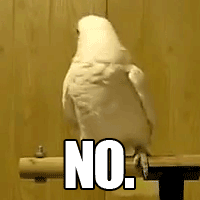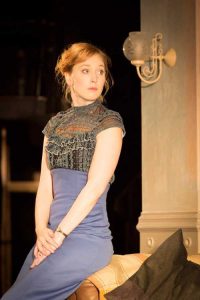Nora is introduced during the play as a selfish, irrational character that often acts impulsively and in a childish manner. Throughout the play, we are slowly introduced to Nora as a very 3-D, dimensional, round character that is more than the childish front that she puts up. This is often represented clearly through the different situations she faces and the way that she uses her wit to achieve what she wants. In that way, we can easily observe and understand the stereotypical front that she puts on, and appreciate the raw reality and relatability of this character as she is approached and portrayed in a more realistic point of view. This is relatable today as people tend to put and follow unrealistic fronts and conform to them to be accepted by society and liked by the ‘in-group’. My first impression of Nora Helmer was that she was quite an ‘airhead’ and didn’t think through before saying or doing things. I think also that because of this attribute she tends to find herself in sticky situations that she has no experience in dealing with. At the beginning, I found that her submissiveness and naivety quite tedious as was easily influenced by everyone around her and didn’t acknowledge her unhealthy relationship with her husband and his continuous manipulation to gain anything he wants from her. As the act progressed, I realized that that was in fact not the case as she was quite aware and manipulative herself nonetheless, in a more subtle and cunning way. This behavior though is understandable because she went from her father being the leading manipulative, idolized male figure to her husband. So she hasn’t really had the time to explore her own personality and have time to herself to understand herself, her goals, and ambitions before diving into a relationship. This leads to her being co-dependent on the men in her life and always acting like a child or a damsel in distress around them.
~Her husband’s nicknames for her:
Throughout the act, Nora Helmer’s husband Torvald uses several nicknames or pet names for her to call on her or just display his ‘affection’. Torvald uses odd nicknames such as; my little skylark, my little sparrow, spendthrift, my little squirrel, little lark, and miss sweet tooth. Most of these nicknames contain a common aspect of birds that are considered a bizarre thing to call your significant other. The usage of birds is used in the text to symbolize Nora as a person in captivity or a ‘pet’ towards Torvald. Additionally, the usage of the possessive pronoun of “MY” shows Torvald’s possessiveness towards her and that he treats her more as a possession than a human with feelings. The usage of birds is also quite demeaning from Torvald’s end as it is an animal and often animals aren’t viewed as an equal to a human. Although Torvald might be doing it unconsciously all the time he instills a mindset in her to show that she will always need him. This is seen through these nicknames as usually, animals need to be fed and have things done for them as they require responsibility. This manipulation from Torvald towards Nora is quite significant as it leads Nora to conform to his choices and follow his irrational decisions even if she doesn’t agree with them simply just because she is blinded by the manipulation. Torvald also tends to do this a lot to stroke his own ego and to display his consistent arrogance, dominance, and superiority.
~Her use of Helmer’s first name (taboo at the time in Norway)
Nora notably refers to her husband, Torvald, by his first name throughout the play which was considered to be taboo at that time period in Norway. That is due to the fact, that women were considered to be more of a lesser being and were expected to follow a stereotypical protocol at home which didn’t include using first names and equating the husband and wife. Women were usually expected to address them in praising and in a more superior manner so that there is a difference in hierarchy and status when interacting with the different sexes. Firstly, Nora and Torvald usually exchange first names when they are in a serious situation that they are discussing and when Nora in particularly really wants something that is important to her. Furthermore, Nora also uses Torvald’s first name when she is quite flustered or anxious about something which usually changes the tone of the conversation to a more serious tone. Nora perhaps also uses his first name consciously to show him at times that she is a grown woman and not a child and shouldn’t be treated in that manner. This also shows that she is aware of his treatments and has some ideas and thoughts of her own that simply do not line up with his ideologies. Personally, I believe that Nora also does that to establish a sense of equality between the couple and to show Helmer that she is just the same as he is. This sense of subtle manipulations and sense of standing up for herself works when she is trying to set her ground but, Helmer usually counteracts that by not taking her seriously, calling her ridiculous nicknames, and trying to distract her with different tactics.
~Her fondness for “contraband” macaroons :
At the beginning, I believed that Nora choosing to eat macaroons even though they were a luxury that they can’t afford, was absurd, as they are undergoing a financial crisis. However, as the play goes on I realize that eating the macaroons wasn’t only based on her love and appreciation of the sweet but it was in fact just to spite Torvald. Nora liking the sweet is part of the reason behind why she is eating it, yet, displeasing Helmer and going against what he said was more of the motive behind her insensible actions. Her stubbornness stems from the reasoning that she wants a fraction of that feeling of superiority that Helmer obtains, and also to show Helmer that she is quite capable of breaking his rules and going against what he says. This helps the reader interpret that she doesn’t have much respect for her husband, as well as her following him and his rules, are notably due to instilled fear from within her and NOT respect. Furthermore, her going behind her husband’s back also shows that she is quite comfortable lying to her husband and hiding things away from him even if they are as harmless as macaroons. I believe that she is doing this as a form of stubbornness by breaking Torvald’s rules and rebellion to try and prove herself as a strong character.








 I was very skeptic of Torvald’s role in “A Doll’s House” and, much like the rest of my peers, regarded him as controlling and nothing close to an innocent. The reading of Act 3 has only further grounded my opinions. I found myself feeling some sort of empathy towards Torvald in this act as a cause to his interaction with Ms. Linde, when he was unforgivably drunk. It can be said that ones ID shines through when they are drunk, as they have no control over their actions and any reliance on EGO and SUPEREGO becomes non-existent. And thus, when Torvalds goes on about how Ms. Linde “ought to embroider” (Ibsen, 54), going into intricate detail on how she should “hold the embroidery thus in your left hand… with a long, easy sweep” (Ibsen, 54), it is hard not to have pity on the man. With such sensitive knowledge of a stereotypical feminine task, and this knowledge belonging to a man, it is easy to imagine Torvald as being nothing more than a man suppressed by his SUPEREGO. This, of course, coming about from the strict and constricting ideology imposed by Victorian society, in which existed specific roles for each gender. I feel this gravitation towards the feminine may be an ode to Torvald’s own teachings as a child, in which his mother steered his attention towards usually feminine tasks. It was Victorian society that forced this interest into his ID, which he shows off when drunk.
I was very skeptic of Torvald’s role in “A Doll’s House” and, much like the rest of my peers, regarded him as controlling and nothing close to an innocent. The reading of Act 3 has only further grounded my opinions. I found myself feeling some sort of empathy towards Torvald in this act as a cause to his interaction with Ms. Linde, when he was unforgivably drunk. It can be said that ones ID shines through when they are drunk, as they have no control over their actions and any reliance on EGO and SUPEREGO becomes non-existent. And thus, when Torvalds goes on about how Ms. Linde “ought to embroider” (Ibsen, 54), going into intricate detail on how she should “hold the embroidery thus in your left hand… with a long, easy sweep” (Ibsen, 54), it is hard not to have pity on the man. With such sensitive knowledge of a stereotypical feminine task, and this knowledge belonging to a man, it is easy to imagine Torvald as being nothing more than a man suppressed by his SUPEREGO. This, of course, coming about from the strict and constricting ideology imposed by Victorian society, in which existed specific roles for each gender. I feel this gravitation towards the feminine may be an ode to Torvald’s own teachings as a child, in which his mother steered his attention towards usually feminine tasks. It was Victorian society that forced this interest into his ID, which he shows off when drunk. This empathy towards the “misunderstood” husband would have lasted, were it not for Torvald’s attempted rape on Nora. I would classify this act as “attempted rape” due to Nora’s dissent, which includes lines such as “Go away, Torvald! You must let me go. I won’t-” (Ibsen, 55) when Torvald attempts to assert himself onto her. As we are speaking of ID, this act can easily be seen as his inner longings urging him to commit such a heinous crime. However, society may play a big part in this again, thus making Victorian society, and not Torvald, the true villain. It was the norm at the time for a wife to serve her husband almost as an object and offer her body whether she was willing or not. This is further reinforced by Torvald’s comments after the fact: “What’s that?… you won’t? Am I not your husband?” (Ibsen, 55). This act, whether under the influence of alcohol or not, is truly appalling and, quite frankly, should be seen as disgusting to any 21st century viewer today. Women are not objects and will not be treated as such.
This empathy towards the “misunderstood” husband would have lasted, were it not for Torvald’s attempted rape on Nora. I would classify this act as “attempted rape” due to Nora’s dissent, which includes lines such as “Go away, Torvald! You must let me go. I won’t-” (Ibsen, 55) when Torvald attempts to assert himself onto her. As we are speaking of ID, this act can easily be seen as his inner longings urging him to commit such a heinous crime. However, society may play a big part in this again, thus making Victorian society, and not Torvald, the true villain. It was the norm at the time for a wife to serve her husband almost as an object and offer her body whether she was willing or not. This is further reinforced by Torvald’s comments after the fact: “What’s that?… you won’t? Am I not your husband?” (Ibsen, 55). This act, whether under the influence of alcohol or not, is truly appalling and, quite frankly, should be seen as disgusting to any 21st century viewer today. Women are not objects and will not be treated as such.



